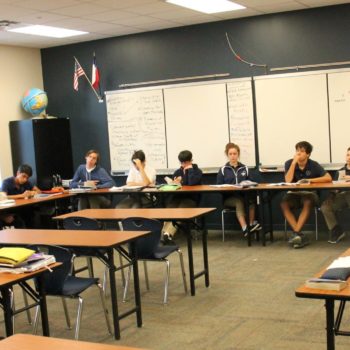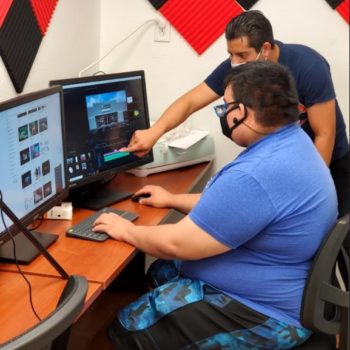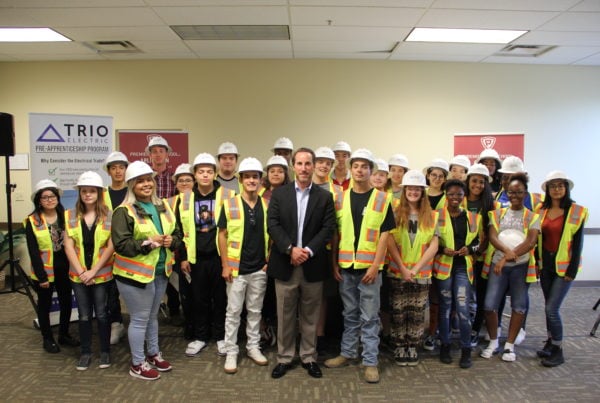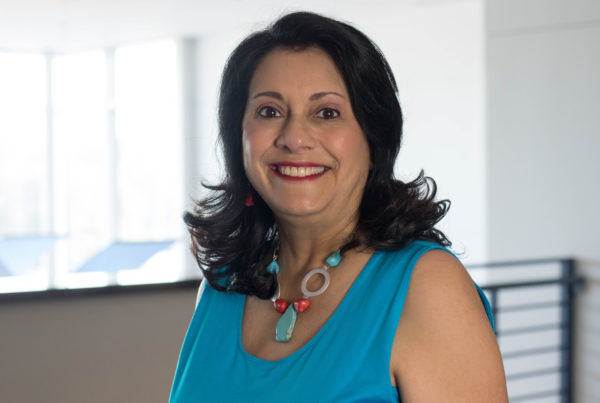On Tuesdays and Thursdays, ninth grade students in literature class at Founders Classical Academy of Leander rearrange their desks into a circle. They pull out their books and start talking. Their teacher, Mr. Peterson, sits outside of the circle. If it is a good class he won’t have to speak. Rather than listening to him lecture, they engage in a student-led seminar discussion.
Mr. Peterson only interjects if they fail to keep each other on topic. His goal is not to see which students can best regurgitate his lectures, but to teach them how to engage in logical, thoughtful conversations with their peers–a skill that will serve them well in virtually every walk of life.
Kathleen O’Toole, the school’s headmaster, believes the seminar style classes fit well in the classical curriculum. When the students are focused on good content, they develop a basis for discussing ideas with others.
“Seminar discussions are important especially for high school students because they teach students how to disagree with each other in a respectful way, without arguing, and teaches them to learn through conversation with other people. Becoming a dialectic learner is a very difficult thing to do, but an important thing to do because there are some things that can only be discovered through conversation. Taking notes on a book or memorizing elements of the plot is helpful, but a literature class that relies only on those methods fails to introduce students to the depth of what they’re reading,” said Dr. O’Toole.
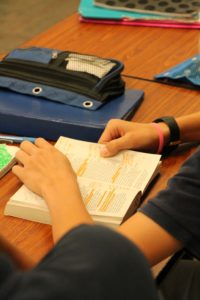
Seminar discussions require students highlight, underline, annotate and outline the texts in preparation.
Mr. Peterson has found that building in regular seminar style literature classes helps students stay engaged and challenges them to take ownership of the content they study. He believes literature offers a particularly accessible subject for high school discussion because it directly relates to the human experience.
“The great thing about literature is that even if you aren’t a strong reader, we are all humans who have passions and thoughts, and that is what literature is all about. Being able to articulate your experience as a human being will enrich you. Your passions will deepen as you develop a language to express your soul,” said Mr. Peterson.
Grace Stepek, a ninth grader currently in Mr. Peterson’s class, looks forward to the lively debates that occur in her literature class.
“When you think about or write something, it might make sense to you. But when you have to argue for it aloud and cite the texts, other students will show you the holes in your argument. A lot of time I come away with a different opinion than I had at the beginning of seminar,” said Grace.
Ninth grader Christine Johnson says seminar has helped her unlock the works she has encountered and develop arguments for her papers.
“When you first start reading, you just read what happens but you don’t always think why it happens. So gathering evidence to make an answer can be difficult since there can be a lot of different reasons and factors. Having to do that for seminar was difficult at first, but it has really helped me open up to my peers. It is very open, no one shoots you down. If they disagree with you, they have to show textual evidence,” said Christine.
Now in tenth grade, Ava Norman says the experience she gained in ninth grade improved her confidence.
“I really learned how to ask questions, think about questions, interact with other students, find a good time to speak and debate in a group setting. I am much better now at thinking about what other people have said, asking questions and articulating my own answers,” said Ava.
Knowing his students have the background knowledge they need to engage in the literature, Mr. Peterson starts the discussion by reading aloud the students’ journal entries. It gives them the opportunity to see what their peers think about the reading and launches them into a discussion with some direction
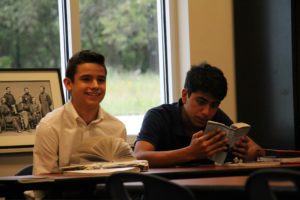
Seminar discussions encourage lively debates backed by textual evidence.
“It creates a good environment where students want to know the text so they can contribute. If an outsider sees the class that is what they remark on the most. The students are very invested in it. They care about fate, the gods and what justice is,” said Mr. Peterson.
The seminar only has two rules. First, they must only respond to the last person who spoke. Second, they must cite the text to backup their contributions to the discussion.
“My goal is to empower students to read on their own and help them realize they can ask the important questions. By the end of the year, they can write well because they know how to have a dialogue, a thesis and antithesis. They aren’t daunted by reading difficult books,” said Mr. Peterson.
Seminar discussions also help students develop skills they will use across the disciplines. They learn how to articulate their thoughts and arguments which improves their writing. They learn how to discuss differing ideas respectfully and productively, while hearing critiques of their ideas. They learn to stay on topic and develop the confidence in their ability to come up with intelligent ideas. Developing these skills fosters a positive culture where everyone is engaged with each other seeking truth.
A sixth grade literature teacher, Ms. Loy has also seen the benefit of introducing her students to seminar classes. At the beginning of each year her students file into Mr. Peterson’s class to observe what is expected of them when they have seminar. While her seminar classes are less regular, she believes frequent seminars help students transition from middle school to high school as they start moving from concrete understandings to more abstract ideas.
“In sixth grade students start to take more responsibility, I find seminar provides a great opportunity for students to practice responsibility and being respectful of each other as well as develop the critical thinking they are just starting to do” said Ms. Loy.
With younger students, Ms. Loy adopted a seminar style that provides her students with more context and accountability that helps them develop the habits they need to be successful. Before students read their assigned chapters, she provides them with the seminar prompt questions to help them focus their reading. To ensure they pay attention she requires them to take notes during seminar and submit them to her to check after class.
As some students might be more likely to dominate a discussion, towards the end of class she requires everyone who has already spoken to remain silent and require those who have been silent to contribute. After almost a full year of incorporating seminar classes, she had found her students are engaged and excited about class.
“My students ask to have seminar all the time. When I announce we are going to have seminar on Thursday they start to cheer. They appreciate being challenged and feeling like their opinion matters. We often forget that our students are very capable because we are measuring it wrong. In seminar their natural curiosity comes out,” said Ms. Loy.
Mr. Peterson and Ms. Loy hope that engaging students and providing them with opportunities to develop good character, responsibility and habits will help students become lifelong learners.

